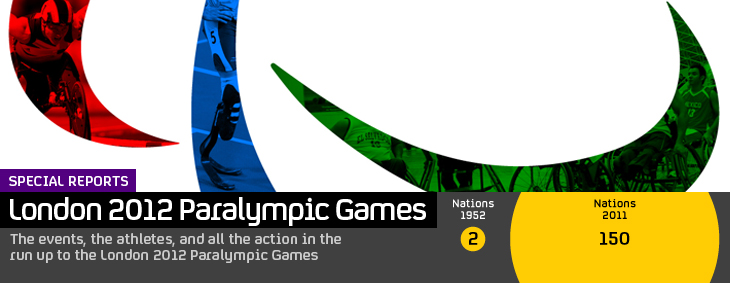Paralympic archive: fighting apartheid (1982)
As English footballers returned from an unofficial tour of apartheid South Africa, disabled protesters were demonstrating against the arrival of the South African team for the Stoke Mandeville Games.
Opposition to apartheid cast a dark shadow across sport throughout the 1980s, writes Ian Searcey. The refusal of the South African government to countenance racially integrated teams had resulted in international sanctions on sporting links including expulsion from the IOC and Fifa.
These measures were intended to put moral pressure on individual sportsmen and women to avoid competition with South Africa, but the extent of boycotting, the degree of contact permitted and the severity of punishment of “rebels” who defied the sanctions, varied between different sports.
The financial rewards offered by “rebel tours” for experienced players coming to the end of their careers sometimes proved too tempting.
Unofficial tour
In July 1982, Malcolm Brabant was at Heathrow Airport for ITN to greet some of the footballers returning to the UK from an unofficial tour organised by Jimmy Hill.
The tour had been abandoned early in the face of protests. The protests then moved on to Buckinghamshire, which saw a noisy demonstration opposing the arrival of South African athletes for the 1982 International Stoke Mandeville Games.
At the airport Watford footballer Billy Jennings was “unrepentent” about the tour, while Dave Watson was sorry that the trip had been cut short, but proved unwilling to answer questions about his future in the game.
‘Ambassadors for apartheid’
At Stoke Mandeville, veteran disabled protester Vic Finkelstein, crippled in a pole-vaulting accident in 1954 and deported from South Africa in 1967 for his support of the anti-apartheid movement, was leading a vocal demonstration against the South African athletes.
Although the arriving team did include black competitors, Finkelstein claimed the plight of both able-bodied and disabled black people under apartheid justified the protest. Other protesters accused the South Africans of being “ambassadors for aparthied”.
There would be 10 more years of sanctions and protests before the collapse of white majority rule led to South Africa returning to the international sporting community.
A respected psychologist, Vic Finkelstein also campaigned for disabled rights, worked for the Open University and later in the Centre for Disability Studies at the University of Leeds. He died in 2011.
-
Latest news
-
‘Government responsiveness should be improved’ says infected blood inquiry chair4m

-
Infected Blood scandal: How UK failed on a global scale4m

-
‘There’s a strong evidential basis’ for ICC to grant arrest warrants for Netanyahu, says criminal law expert4m

-
International Criminal Court prosecutor seeks arrest warrants for Israel PM and Hamas leaders3m

-
‘Highly unlikely there was foul play’ in Iran president helicopter crash, says Tehran professor5m

-





